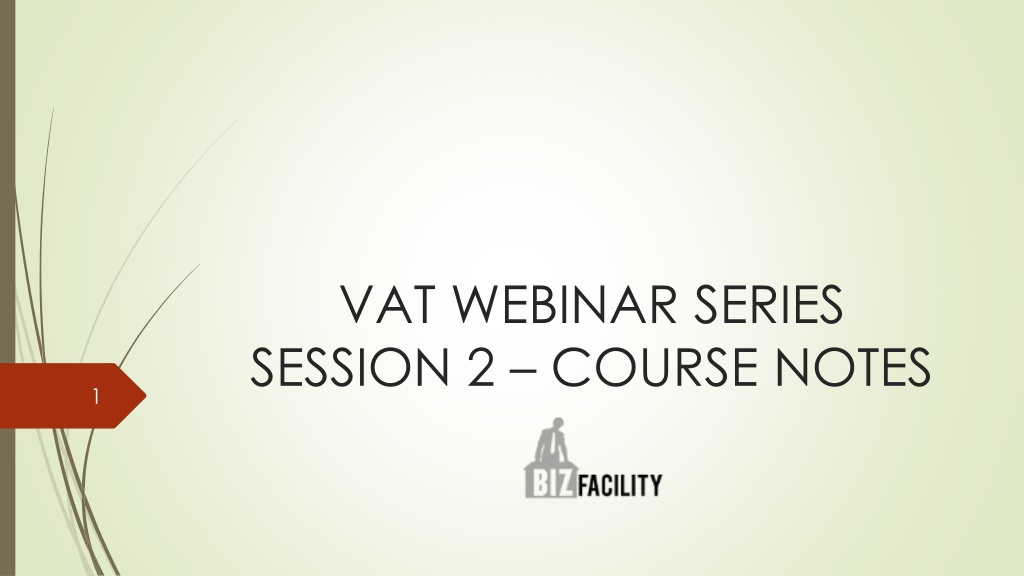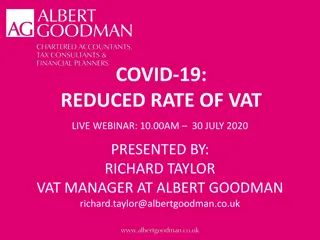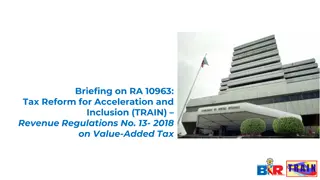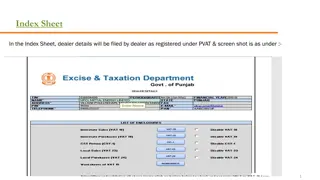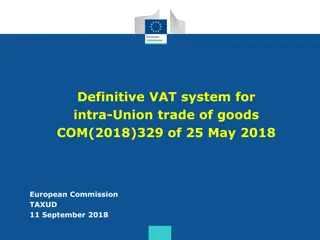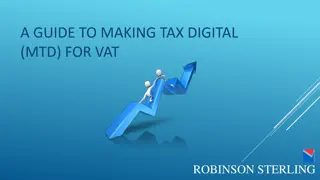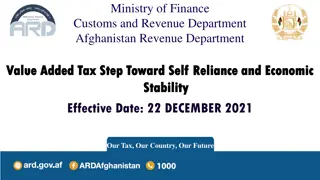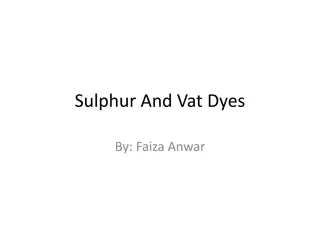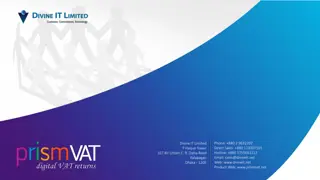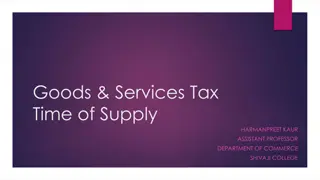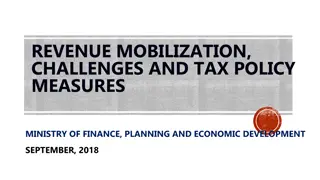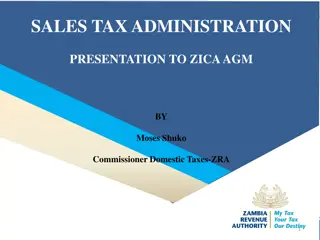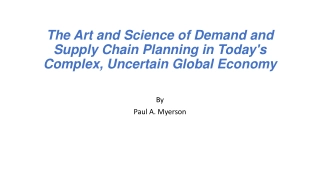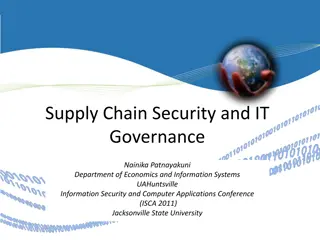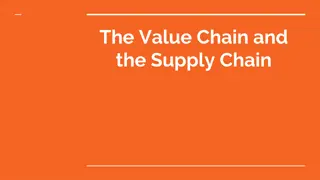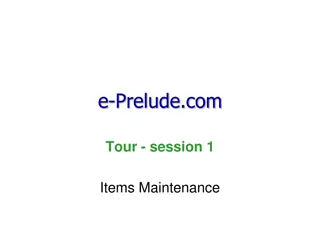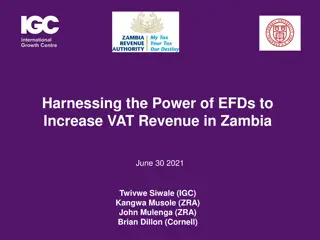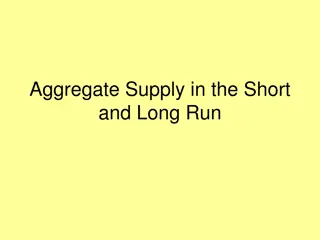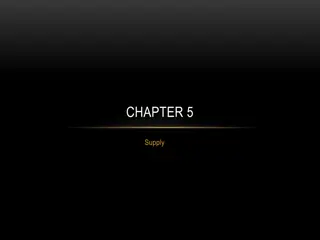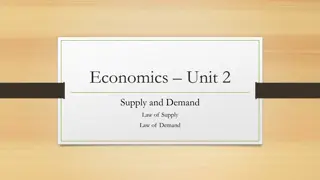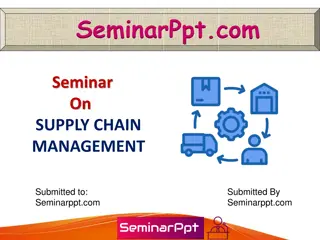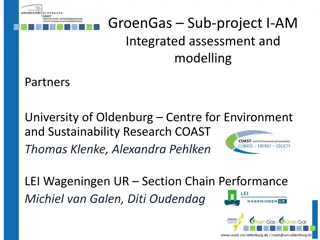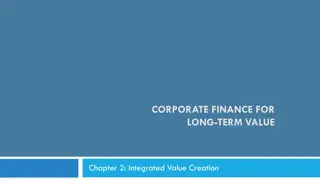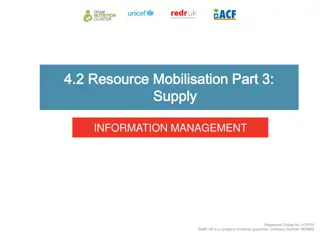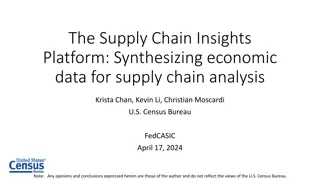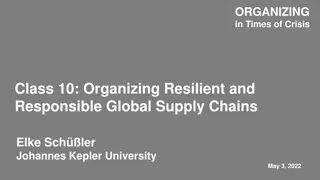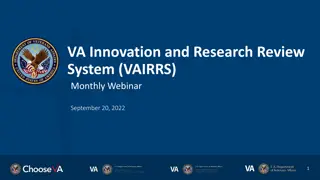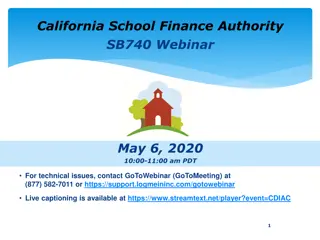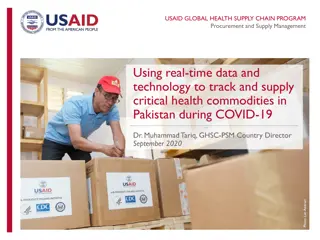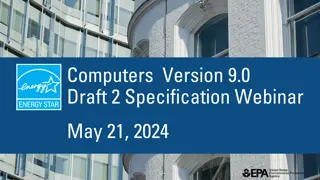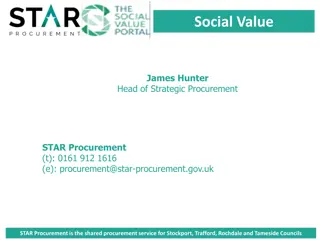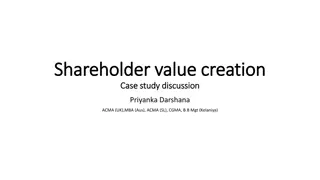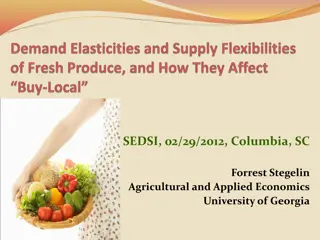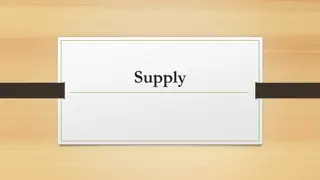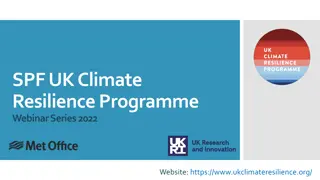Understanding Time and Value of Supply in VAT Webinar Series
This course note covers the essential aspects of time and value of supply in relation to VAT rules. It explains key rules that determine when VAT must be accounted for and paid, focusing on important regulations impacting vendors. Topics include general time of supply rules, rules for connected persons, and examples illustrating the application of these rules. Understanding these concepts is crucial for accurate VAT reporting and compliance.
Download Presentation

Please find below an Image/Link to download the presentation.
The content on the website is provided AS IS for your information and personal use only. It may not be sold, licensed, or shared on other websites without obtaining consent from the author. Download presentation by click this link. If you encounter any issues during the download, it is possible that the publisher has removed the file from their server.
E N D
Presentation Transcript
VAT WEBINAR SERIES SESSION 2 COURSE NOTES 1
CHAPTER 1 2 TIME AND VALUE OF SUPPLY 1. 2. This chapter explains the time and value of supply rules which apply to certain supplies of goods or services. Not all of the time and value of supply rules have been included in this chapter, but only the ones which are the most important have been mentioned. These rules are important as vendors need to know how much VAT must be accounted for in a particular tax period, and by when that tax must be paid. This is based not only on the timing and valuation rules, but also the accounting basis and tax period which determines the due date for payment and the rendering of returns. Note that some rules which impact on the timing and valuation of certain transactions may also be found elsewhere in the Act. In addition, in the case of taxable fringe benefits, the provisions of the Seventh Schedule to the Income Tax Act may apply, and in the case where the taxable fringe benefit involves a motor vehicle. INTRODUCTION 2. TIME OF SUPPLY 1. General rule Generally, the time of supply is the earlier of the time an invoice is issued by the supplier (or the recipient) in respect of that supply, or the time any payment of consideration is received. However, specific time of supply rules applies to certain transactions.
3 Connected persons Where the supplier and the recipient are connected persons, a supply of goods or services is deemed to take place as follows: Where the supply is of goods to be removed, at the time of removal. Where the supply is of goods not to be removed, at the time the goods are made available to the recipient. Where the supply constitutes services, at the time the services are performed. Where an invoice is issued or payment is received on or before the date that a return was submitted (covering the tax period in which the goods or services are deemed to be supplied as stated above), or the last day for submitting a return for that tax period, the normal time of supply rule will apply. A relative A person in relation to a company where that person (including his spouse, minor child or any trust in respect of which that person, his minor child or beneficiary) is separately or jointly interested in 10% or more in that company A company in relation to any other company where those companies have substantially the same shareholders or are controlled by substantially the same persons A trust fund in relation to the beneficiaries of that fund A member or partner in relation to a close corporation or partnership Any person or superannuation scheme, the members of which are mainly the employees or office holders or former employees or office holders of that person These are only to name a few. In other words, any person that can benefit financially from this connection.
EXAMPLE - Time of supply for connected persons 4 Farmer A is a vendor registered under Category B. He rents a harvesting machine to his son during the peak season from January to March. His son collected the machine on 10 January 2013. Farmer A submits his return for February on 25 March 2013. If no payment was received, and no invoice was issued by 25 March 2013, the time of supply will be at the time that the goods were removed, as Farmer A and his son are connected persons. Farmer A will, therefore, have to account for the supply in his February 2013 return. If Farmer A issues an invoice for the rental on or before 25 March 2013, the normal time of supply rules apply, in which case, Farmer A will declare the VAT on the supply in the return ending April 2013. 3. Progressive, successive and periodic supplies Where goods are supplied under a rental agreement or services are supplied where provision is made for periodic payments, they are deemed to be supplied successively. The time of supply is deemed to take place on the earlier of the date when payment is due or is received. Some examples are office or car rentals, maintenance or management contracts and cleaning services. In the case of goods and services supplied directly in the construction, repair, improvement, erection, manufacture, assembly or alteration of goods where the agreement provides for the consideration to become due and payable in instalments or periodically in relation to the progress made, the time of supply is the earliest of the date when payment is due or is received, or any invoice relating to the payment is issued.
5 This time of supply rule also applies in any other case where goods are supplied periodically or progressively in terms of any agreement or law which provides for the consideration to be paid at intervals, based on the progressive or periodic nature of the supply. An example is an agreement whereby goods are to be supplied monthly over a stated period at an agreed price. Example Progressive supplies (construction) Joe s Construction is registered for VAT under Category C tax period (monthly) and enters to a contract to build 50 residential units for a total contract price of R6 500 000 (VAT inclusive) . The agreement provides for monthly progress payments to be made over a period of 12 months. At the end of January 2013 and February 2013, the work certified as completed by the appointed Project Manager was 10% and 23% respectively. Joe issued two tax invoices as follows: Invoice 1357 Invoice 1358 31 January 2013 28 February 2013 R845 000 (23% of R6 500 000 less R650 000 already invoiced) R650 000 (10% of R6 500 000) As the goods are deemed to be supplied progressively, Joe will not account for the full contract price at the time the agreement is entered into. Joe will account for VAT of R79 824,56 (14 / 114 R650 000) in his January 2013 return and R103 771,93 (14 / 114 R845 000) in his February 2013 return. 4. Instalment credit agreement (ICA) Where goods are supplied under an ICA, the supply is deemed to take place the earlier of the time the goods are delivered or any payment of the consideration is received by the supplier. Goods supplied under an ICA are not regarded as being supplied successively
6 5. Fixed property Goods consisting of fixed property or any real right therein are deemed to be supplied upon registration of transfer of the property in a deeds registry, or the date upon which any payment is made in respect of the consideration (whichever occurs first). Note that a deposit is not considered to be anypayment until the seller is able to apply that payment as consideration for the supply. Similarly, where the payment is held in a trust by an estate agent or attorney, it does not constitute payment made, as the seller cannot apply the amount against the outstanding debt at that time. 6. Fringe benefits Where the cash equivalent of the benefit is required to be included in the remuneration of the employee who has received a benefit or advantage in terms of the Fourth Schedule to the Income Tax Act, the time of supply is the end of the month in which such benefit is required to be included as remuneration. Where the cash equivalent is not required to be included monthly or weekly in the amount of remuneration, the time of supply is the last day of assessment of the employee in terms of the said Act.
Example Motor vehicle supplied as a fringe benefit 7 David s Wholesalers (a vendor registered under Category B tax period) purchases a motorcar for R114 000 (including VAT of R14 000) on 1 March 2013. David s Wholesalers is not entitled to deduct an input tax credit on the acquisition of the motorcar as it is a prohibited deduction. An employee of David s Wholesalers (who is paid monthly) is granted the right to use the motor car with effect from 1 March 2013, and David s Wholesalers bears the full cost of maintaining the vehicle. David s Wholesalers must account for output tax on the supply of the fringe benefit as follows: Step 1 Consideration in money = determined value of the motor car 0,003 (0,3%)= (R114 000 R14 000) 0,003 = R300 Step 2 The amount of output tax payable per month will be = R300 14 / 114 = R36,84 Step 3 The first tax period covers the months of March 2013 and April 2013 and output tax on the fringe benefit must be declared in Field 12 of the VAT201 return and paid on 25 May 2013 and for every tax period thereafter as follows: R36,84 2 months = R73,68 Note that where the input tax on acquisition of the vehicle was allowed (for example a bakkie) the consideration in money is calculated by applying a factor of 0,006 (0,6%) instead of 0,003 (0,3%). Where the employee bears the full cost of the repairs and maintenance and receives no compensation, the Consideration as determined above must be reduced by the lesser of R85 or the consideration for the fringe benefit determined monthly.
0,03% 0,06% Maximum of R 85,00 8 Input was NOT claimed Input was claimed Employee is responsible for the maintenance of the vehicle 7. Lay-by agreements When goods are supplied in terms of a lay-by agreement, the supply is only deemed to take place when the goods are delivered. A lay-by agreement is one where the consideration for the supply is R10 000 or less and the supply is reserved by the payment of a deposit. In these types of transactions, delivery usually only takes place when the full purchase price, or agreed portion thereof, is paid. The supplier is therefore not liable to account for any VAT on the amount received as a deposit unless and until delivery has taken place. If the lay-by sale is cancelled or terminated for any reason, any deposit payment retained by the vendor or any amount of the consideration paid (or which is recoverable) is regarded as consideration for a taxable supply of services by the vendor. In such cases, the vendor must account for output tax on the total amount retained in the tax period during which the sale was cancelled or terminated.
9 8. Machines, meters and other devices A special time of supply rule applies when supplies are made via machines, meters and other devices which accept payment by way of coins, tokens, paper money or cards. Examples include vending machines such as; those that dispense snacks, cooldrinks and cigarettes; arcade video games; pool tables; parking meters and public telephones. The time of supply rule for the vendor making the supply is the time that the money or tokens are removed from the machine, meter or device. In the case of payment in any other form being accepted by the machine, meter or device (for example, debit or credit card), the time of supply is the time that the payment was received by the supplier. The time of supply for the recipient is when the payment is inserted into the machine, meter or device or when payment is tendered through other means. 9. Betting transactions When any person bets an amount on the outcome of a race, competition or on any other event or occurrence, the person accepting the bet is deemed to supply a service to the person placing the bet. A vendor accepting bets in the course or furtherance of the enterprise must account for output tax on betting transactions in the tax period during which payment of any bet placed with that vendor is actually received. This rule applies whether the vendor accounts for VAT on the invoice or payments basis. Bets must be an amount on the outcome of a race or any other event or occurrence.
10 VALUE OF SUPPLY 1. General rule Where a price is charged for goods or services, the consideration for the supply will normally be equal to the amount of money which is payable. The consideration for a supply is represented by the value plus the VAT charged. Where the consideration is not in money, the consideration will be the open market value thereof. Note that the open market value includes the VAT element. Specific value of supply rules apply to certain transactions. Note that although section 10 of the VAT Act is titled Value of supply , some of the subparagraphs in that section prescribe the consideration for the supply instead of the value of the supply. 2. Connected persons The normal value of supply rules also apply to connected persons. However, where the supply is made for no consideration or for a consideration which is below the open market value, the consideration for the supply is equal to the open market value if- the recipient does not acquire the goods or services wholly for taxable (enterprise) purposes; or the recipient would not have been entitled to a full input deduction on the goods or services acquired, had the open market value been charged on the supply.
11 2. Instalment credit agreement (ICA) The consideration in money is deemed to be the cash value of the supply. The cash value includes the cost of acquisition of the goods and VAT. The cash value is normally the amount which is capitalised to the cost of an asset, for example the purchase price, import duties, transportation, installation costs, and any other costs directly attributable to bringing the asset to the location and condition necessary for it to be used as intended. The cash value does not include the cost of providing credit (that is, interest, finance charges or any amount determined with reference to the time value of money). 4. Commercial accommodation The supply of commercial accommodation is a taxable supply. Commercial accommodation includes board or lodging supplied together with domestic goods or services (for example, meals, laundry services, the use of a telephone) in a house, flat, apartment, room, hotel, guest house etc. The total receipts for the supply of the commercial accommodation must exceed R120 000 for a period of 12 months before the activity will fall within the definition of an enterprise as defined. For example, a guest house which does not supply (or is not likely to supply) accommodation together with domestic goods and services in excess of the R120 000 threshold in a consecutive 12-month period, will not be able to register as a VAT vendor. Commercial accommodation excludes the letting or hiring of a dwelling which constitutes the place of residence of a natural person or the supply of employee housing, both of which are exempt supplies. Where a person stays in an establishment which provides commercial accommodation for an unbroken period of more than 28 days, only 60% of the all-inclusive charge for the accommodation and the domestic goods and services is subject to VAT at the standard rate. Where a person stays for a period less than 28 days, the full amount charged is subject to the VAT at the standard rate. Any domestic goods or services which are charged separately and are not included in the all-inclusive tariff for the accommodation, are also taxed in full at the standard rate.
12 5. Barter transactions In barter transactions, goods or services are exchanged for other goods and/or services. Payment may also be partly in money, and partly in goods and/or services exchanged. Where payment is in money, the consideration for the supply will be the amount of money. To the extent that payment is not in money, the consideration is the open market value (OMV) of goods and/or services received. 6. Consideration only partly for a taxable supply When a consideration relates only partly to a taxable supply of goods or services, VAT is calculated only on that portion of the full consideration which is properly attributable to the taxable supply. For example, when a tour operator charges a non-resident for a tour package in RSA, the VAT is calculated and paid, based on the consideration attributable to the individual component supplies, for example international travel is subject to VAT at the zero rate; tour guide services are subject to VAT at the standard rate; hotel accommodation is subject to VAT at the standard rate; and airport shuttle passenger transport is exempt from VAT.
13 7. Betting transactions A vendor that accepts a bet from any person (the punter) on the outcome of a race or on any other event, that vendor is deemed to make a supply to the punter. The consideration for the supply of services to the punter is the amount received in respect of the bet. Output tax is calculated by applying the tax fraction (14/114) to the amount of the bet received.
14 CHAPTER 2 TAXABLE SUPPLIES 1. INTRODUCTION VAT is levied on the supply by any vendor of goods or services in the course of any enterprise carried on. The term enterprise as defined, basically follows the lines of a business activity test which has certain exclusions (for example, exempt supplies and supplies which are outside the scope of VAT). A person must register as a VAT vendor if the income from taxablesupplies exceeds R1 million or will exceed that amount in terms of a contractual obligation in writing in any consecutive 12-month period or R50 000 in respect of non-resident suppliers of certain electronic services. A person may also register for VAT voluntarily without meeting the R50 000 threshold under certain circumstances. A vendor is a person who is liable to charge VAT on taxable supplies, whether that person has actually applied for VAT registration or not. The term taxablesupplies includes all supplies made by a vendor in the course or furtherance of an enterprise on which VAT should be levied at the standard rate or the zero rate. As exempt supplies are not taxable supplies, no output tax is levied and no input tax may be deducted on any expenses attributable to making those supplies. A person is considered to be carrying on an enterprise if all of the following requirements are met: An enterprise or activity is carried on continuously or regularly by a person in the Republic or partly in the Republic. In the course of the enterprise or activity, goods or services are supplied to another person. Consideration is payable for the goods or services supplied
2. STANDARD-RATED SUPPLIES 15 A standard-rated supply is a supply of goods or services which is subject to VAT at the rate of 14%. As a general rule, the supply of all goods and services are taxable at the standard rate, unless it is specifically zero-rated, or exempt. The following are some examples of standard-rated supplies (the list is not exhaustive): Land and buildings (fixed property) commercial or residential property bought from property developers, building materials, vacant land bought from a vendor etc. Fees for professional services construction/building, estate agents, consultants, architects, engineers, project managers, doctors, private hospital services, lawyers, plumbers, electricians and accountants. Household consumables and durable goods most grocery items and foodstuffs such as meat, fish, white bread, snacks, most canned foods, cigarettes, perfume, medicines, cool drinks, cleaning materials, clothing, footwear, microwave ovens and other household consumables and appliances. Municipal goods and services such as the supply of electricity, water and refuse removal. Capital assets such as furniture, production machinery, installations, motor vehicles and equipment. Local transport of goods (all modes of transport) and transport of passengers by air or sea. Telephone, internet, computer and other telecommunication services. Rental of goods and commercial property such as office space. Motor vehicles, repair services, lubrication oils and spare parts.
16 When a standard rated supply is made, VAT (output tax) must be charged at the prescribed rate (currently 14%) and input tax may be deducted on any goods or services acquired in the course of making those taxable supplies. The net VAT due by a vendor is calculated by subtracting the input tax incurred from the output tax charged during the tax period. 3. ZERO-RATED SUPPLIES Zero- rated supplies are taxable supplies on which VAT is levied at a rate of 0%. The application of the zero rate must be supported by documentary proof acceptable to the Commissioner. 1. Certain basic foodstuffs Certain basic foodstuffs are zero-rated, provided it is not supplied for immediate consumption (that is, as a meal or refreshment) or added to a standard-rated supply. These include the following: ` Brown bread Brown bread flower (excluding wheaten bran) Hens eggs (that is not from ostriches, ducks etc.) Dried beans Maize meal Pilchards in tins and cans Milk, cultured milk, milk powder and dairy powder blend Dried mielies and mielie rice
17 Samp Fresh fruit & vegetables Lentils Rice Vegetable cooking oil (excluding olive oil) Edible legumes and pulses of leguminous plants (that is, peas, beans, peanuts etc) White bread, white bread flower and sanitary pads added from 1 Apr 2019 The zero rate will not apply where Zero-rated foodstuffs are prepared for immediate consumption, for example a glass of milk served in a restaurant; salad or fruit salad which is ready to eat; sandwiches and other take-away foods. A standard rated product or ingredient is supplied together with a zero-rated foodstuff, for example a pack of vegetables containing a pack of flavoured butter; a pack of rice or beans containing a sachet of flavouring; a gift hamper consisting of a basket of fruit; flavoured cooking oil; a pack of salad to which salad dressing has been added.
18 2. Fuel levy goods Most motor fuels are subject to taxes such as the General Fuel Levy, the Road Accident Fund Levy as well as excise duty. The VAT Act therefore provides that certain specified fuel levy goods are subject to the zero rate. These include crude oil and certain petrol and diesel based products (including biodiesel), which are used as fuel in internal combustion engines. Examples include fuels used in motor cars, trucks, buses, ships, fishing boats, railway locomotives, farming and production machinery. Petroleum oils and crude oil which are refined for the production of fuel levy goods are also zero-rated; however, aviation kerosene, motor oil and oil lubricants are subject to the standard rate. The sale of illuminating kerosene (paraffin) intended for use as fuel or for heating is subject to VAT at the zero rate. However, the zero rate only applies to illuminating kerosene which is marked . Any unmarked illuminating paraffin or other forms of paraffin which are blended or mixed with any other products are subject to the standard rate of VAT. 3. Going concern The sale of a business or part of a business which is capable of separate operation as a going concern qualifies for the zero rate if all of the following requirements are met at the time of entering into the agreement:
19 Both parties must be VAT vendors (if not yet registered at the time of concluding the contract, the purchaser can backdate the registration liability date to the date of the contract). It must be clearly evident, and stated in the wording of the written agreement that the enterprise is sold as a going concern; the business is, or will be an income-earning activity on the date of transfer; the whole business or a part of it which is capable of separate operation is disposed of to the purchaser, including all the assets necessary for carrying on the enterprise or part thereof; and the consideration includes VAT at the rate of 0%. Where any of the above requirements are not met, the supply of the enterprise will be subject to VAT at the standard rate of 14%. Some examples of where an income-activity is not disposed of are: The sale of a bakery business without the ovens. The sale and leaseback of a commercial building. The transfer of the bare dominium of an asset. The disposal of a business yet to commence. The disposal of a dormant business.
20 4. Farming goods The supply of certain goods acquired and used for agricultural, pastoral or farming purposes may be zero-rated in certain circumstances. Some examples are animal feed, animal remedies, fertilizer, pesticide and plants and seeds in a form used for cultivation. 5. Goods temporarily imported for repairs VAT is a tax on local consumption. Where consumption is outside of the RSA, the zero rate applies. Where goods are temporarily admitted into the RSA for processing, repair, cleaning or reconditioning, the services supplied directly in connection with those goods are zero-rated. Any goods which are consumed or permanently affixed to those goods as a consequence of the services being rendered will also be zero- rated. This also applies to foreign-going ships or aircraft. In order for the zero-rating to apply, the vendor must be in possession of a copy of the SARS Customs Declaration evidencing the temporary import as well as the corresponding release notification. Example Foreign-going aircraft temporarily imported for repairs A foreign-going aircraft needs repairs to be carried out to its landing gear while stationed at the Cape Town International Airport. A local vendor is contracted to do the repairs. The services (labour) and spare parts (welding rods, gas, welding plates etc) used in the repairs may be zero-rated, provided the necessary documentary requirements are met.
21 6. Exports The direct export of goods may be zero-rated. In certain instances, the indirect export of goods may also qualify for the zero rate. In both cases certain documentary and other requirements must be met to support the application of the zero rate. DIRECT EXPORTS INDIRECT EXPORTS Goods send from a SA address to a foreign address by way of a cartage contractor or courier Goods are collected at a SA address from the foreign client and the client arranged for the transportation Standard Rated supply 15% Zero Rated supply 0% 7. International transport The international transport of goods or passengers is zero-rated. This includes the cross-border transport of goods or passengers from a place outside the RSA into the RSA or vice versa. The transportation of goods or passengers between two places outside the RSA also qualifies for the zero rate. In a case where the transport of goods is between two places in the RSA which is an integral part of the international transportation service, the local leg of the transport is zero- rated to the extent that the same supplier is contractually liable to the same recipient for both the local and international portions of the transportation service.
22 This does not necessarily mean that the service must physically be performed by the same supplier. The supplier may choose to sub-contract the work to another vendor, but must remain contractually liable to the recipient for the relevant part of the transportation. Similarly, the local leg of a passenger flight that forms part of an international journey by air is zero-rated to the extent that it constitutes internationalcarriage . 8. Land situated in an export country Any service supplied directly in connection with land situated outside the RSA is zero-rated. For example, where a South African resident contracts with a South African vendor to paint a house situated in Botswana, the zero rate will apply. 9. Services physically performed outside the Republic The supply of services physically rendered or performed outside the RSA or in a customs controlled area qualifies for the zero rate. This provision will apply to both residents and non-residents. For example, if a South African vendor renders a once-off consulting service in Botswana for a client in that country, those services are subject to VAT at the zero rate. 10. Certain services supplied to non-residents Where services are supplied to a non-resident who is not in the RSA at the time the services are rendered, the supply will qualify for the zero rate [section 11(2)( )]. Note that the standard rate will apply where the services are directly in connection with:
23 Fixed property (land and improvements) situated in the Republic; or Movable property which is situated in the RSA at the time the services are rendered. However, the services supplied may still qualify for the zero rate if: the said movable property is subsequently exported; or the services supplied by the RSA vendor forms part of a supply by the non-resident to the recipient vendor and the services are acquired wholly for taxable purposes by that recipient. The supply of services in respect of a restraint of trade in the RSA is standard-rated. Example 11 Services supplied by a vendor to a non-resident in respect of movable property (a) Where the movable property is subsequently exported Gold Rock is an RSA vendor and a supplier of mining equipment. Gold Rock supplies a machine to Kivu Minier, a Belgian company that is not an RSA resident and not a vendor in the RSA. Kivu Minier will take delivery of the machine in the Democratic Republic of Congo (DRC), but before Gold Rock can export the machine, it has to be calibrated so that it can be used in the DRC. Kivu Minier therefore acquires the services of Calibration International (an RSA vendor) to calibrate the machine at the premises of Gold Rock before exportation. As the services supplied by Calibration International will be made directly in connection with movable goods situated in the RSA, VAT would usually be charged at the standard rate. However, as the machine is subsequently exported to Kivu Minier, the supply of services by Calibration International (including any incidental goods incorporated into the machine, or consumed in the process of rendering the calibration services) will be subject to VAT at the zero rate.
24 11. Municipal property rates Any municipal property rates charged by a municipality are subject to the zero rate. However, the municipal rates charge must be separate and distinct from other charges levied for goods or services by that municipality. Therefore, where a municipality charges a flatrate which includes a charge for municipal rates, plus other charges for water, electricity, refuse removal, or other standard-rated goods or services supplied, the entire charge is subject to the standard rate. 12. DEEMED SUPPLIES As a registered vendor, you may sometimes be required to declare an amount of output tax even though you have not actually supplied any goods or services. The VAT Act contains deeming provisions which both widen the range of transactions subject to VAT and clarify the instances where certain transactions will be deemed to be taxable or not. Deemed supplies will generally attract VAT at the standard rate. However, in some instances the zero rate will apply. Examples of deemed supplies on which a vendor has to account for output tax at the standard rate include trading stock taken out of the business for private use; certain fringe benefits provided to staff; assets retained upon ceasing to carry on an enterprise; short-term insurance claims that have been paid in connection with the enterprise (for example, insurance payout received for damaged or stolen stock); betting and other gambling transactions; change in use adjustments
25 CHAPTER 3 EXEMPT SUPPLIES 1. INTRODUCTION The definition of enterprise is an activity based test which is applied to determine whether certain supplies are taxable or not. Exempt supplies are supplies of goods or services where VAT is not chargeable at either the standard rate or the zero rate and will not form part of taxable turnover. A person who only makes exempt supplies cannot register as a vendor or charge VAT on those supplies. This means that any VAT incurred to make exempt supplies may not be deducted as input tax. Some examples of exempt supplies include financial services (such as, interest earned for the provision of credit, life insurance, the services of benefit funds such as medical schemes, provident, pension and retirement annuity funds); donated goods or services sold by non-profit bodies (such as, religious and welfare organisations); residential accommodation in a dwelling (but not holiday accommodation); passenger transport in South Africa by taxi, bus, or train; educational services provided by recognised educational institutions such as, primary and secondary schools, technical colleges, or universities which have been approved as public benefit organisations (PBOs) in terms of section 30(3) of the Income Tax Act, or an organisation which has been approved by the Commissioner as being exempt under section 10(1)(cA)(i) of that Act; and childcare services provided at cr ches and after-school care centres.
26 2. LETTING AND SUB-LETTING OF DWELLINGS VAT is not levied on the rent charged by a lessor to a lessee for the supply of a dwelling under a lease agreement. This rule also applies to employee housing supplied by an employer, whether a rental is charged or not. A dwelling is basically defined as a building or a part of a building which is used, or intended to be used, as the residence of a natural person, and includes any fixtures and fittings enjoyed with the supply of the dwelling. The definition excludes the supply of commercialaccommodation . Where a number of residential dwelling units are let to a person who in turn sub-lets them to other persons, as long as the nature of the supply under both the main lease and the sub-leases constitutes the supply of a dwelling (or dwellings), the exemption in terms of section 12(c) will apply. 3. PASSENGER TRANSPORT (ROAD AND RAIL) The supply of public transport by road or rail is exempt from VAT if the transportation is between two places within the RSA; is of fare-paying passengers and their personal effects; and is supplied in the course of a transport business in a vehicle operated by the supplier of the transportation service or a person acting as the supplier s agent.
27 The following points should also be noted in regard to exempt passenger transportation: A charge or fee levied for a game-viewing drive does not fall within the ambit of this exemption. The transportation of goods does not fall within the exemption, except to the extent that it relates to the transportation of the personal effects and baggage accompanying the fare-paying passenger. Transportation of passengers by air and sea constitutes a standard-rated taxable supply and does not fall within the exemption. Where an international transportation service is supplied, the zero rate will apply instead of the exemption. 5. EDUCATIONAL AND CHILDCARE SERVICES The supply of educational services by the following entities is exempt from VAT: All State schools or schools registered under the South African Schools Act, 1996 or a further education and training institution registered under the Further Education and Training Act, 1998. Universities, universities of technologies (previously known as technikons), colleges and other institutions providing higher education which are registered under the Higher Education Act, 1997. Institutions which are approved Public Benefit Organisations (PBOs) in terms of section 30 of the Income Tax Act which supply any of the following adult basic education and training (ABET); education and training of religious or social workers ; educating and training of persons with permanent physical or mental impairment; or bridging courses to indigent persons to enable them to enter a higher education institution.
28 6. FINANCIAL SERVICES Some examples of financial services which will normally be exempt are the exchange of currency for example, the rand value given for dollars is exempt, but any fee charged for the exchange service will be standard-rated; equity or participatory securities for example, the sale of an interest in a close corporation, the creation and selling of company shares; and the sale of a share in a unit portfolio of a unit trust scheme; the provision of credit under an agreement for example, the amount payable (that is, interest) for the provision of a home loan or an overdraft on a cheque account; and the finance charges (or any amount determined with reference to the time value of money40) on an ICA; premiums payable on long term insurance policies for example, life policies, sinking fund policies or disability policies; and the buying or selling of derivatives for example, options, futures and interest-rate swaps. All fees, commissions, merchant s discount and similar fee-based charges relating to financial services, are subject to VAT. Banks and other suppliers of financial services must apportion their input tax where goods or services acquired cannot be directly and wholly attributed to either taxable or exempt supplies. Where the financial service is supplied to a non-resident who is not in the country at the time that the service is rendered, the zero rate will apply instead of the exemption.
29 7. DONATED GOODS AND SERVICES The supply by an association not for gain or a welfare organisation of any goods or services which it receives as a donation is an exempt supply. The exemption also applies in a case where the organisation sells goods which it has manufactured if at least 80% of the value of the supply consists of donated goods or services. Associations not for gain and welfare organisations do not declare output tax on any donations received by them in the furtherance of their stated aims and objectives. However, the organisation will be liable for output tax if any so-called donation is conditional upon some form of reciprocity in the form of a supply of goods or services (identifiable direct valuable benefit) by the association to the donor ; or a relative or other connected person in relation to the donor. In such cases, the payment received is viewed as being consideration for a taxable supply made by the organisation.
Example Supply of donated goods by an association not for gain 30 Mr Charity donates his old clothes to a church as well as some off-cuts of wood from his carpentry business (which will be made into chairs by the organisation). The clothes and chairs will be sold at the church s annual bazaar. The church is registered for VAT because in addition to its religious and fundraising activities, it also conducts business activities which involves the purchase and sale of goods where the annual value of supplies exceeds the compulsory VAT registration threshold of R1 million. The VAT implications of the supplies made at the annual church bazaar are as follows: Even though the church is registered for VAT, the sale of the clothes by the church will be an exempt supply. Therefore, no input tax may be deducted in making these supplies. The sale of the manufactured chairs will also be exempt if at least 80% of the value of the materials used in making the chairs consists of donated goods and services. Once again, no input tax may be deducted in respect of making or selling the chairs. However, if the value of the wood constituted 70% of the value and the other 30% of the value is made up of the cost of glue, nails, paint, fabric, rubber stoppers, transport and other taxable inputs, the supply would be taxable at the standard rate (as the church is a vendor). In such a case, input tax could be deducted on the goods or services from vendors which were acquired in order to manufacture and sell the chairs, but not on the wood which was received as a donation. If any other goods which the church purchased were sold at the bazaar, those supplies would be taxable at the standard rate, and input tax could be deducted on the VAT incurred on those purchases. Where goods or services were acquired to make both taxable and exempt supplies at the bazaar, a reasonable portion of the VAT incurred may be deducted. The activities associated with the church s religious activities, for example, efforts to promote the faith and holding church services for its members are not enterprise activities. They constitute non-taxable supplies made for no consideration and are outside the scope of VAT.
31 8. PUBLIC AUTHORITIES When applying the enterprise test in respect of the supplies made by a publicauthority , special rules apply. Government departments are generally not liable to register for VAT, unless they are specifically notified by the Minister of Finance (the Minister) to do so. This means that, as final consumers, the VAT incurred on capital and operating expenses is regarded as a cost to the department. National and provincial public entities listed in Parts A and C of Schedule 3 to the PFMA are treated on the same basis as departments, as they carry on activities which are either similar to those carried out by government departments and/or they are funded mainly by Government. As public authorities are not usually registered for VAT, they will not charge VAT on any goods or services supplied, except if the public authority concerned has been notified by the Minister to register for VAT. A public authority will sometimes pay a grant to a vendor in which case the vendor will be deemed to supply a taxable service to the public authority making the payment. Deemed supplies which arise in respect of grants received by vendors are usually subject to VAT at the zero rate provided that the payments do not constitute consideration for any actual taxable supplies made to the public authority making the payment, or to any other person on behalf of that public authority.
32 CHAPTER 4 INPUT TAX 1. WHAT WILL QUALIFY AS INPUT TAX? Generally, the VAT charged by a vendor to another vendor on any goods or services acquired for the business will qualify as input tax in the hands of the recipient. It does not matter if the goods or services are acquired for the purposes of consumption or use by the business itself, or for the purposes of making a supply to another person. It is important that input tax is only deducted insofar as the supplies are used for the purposes of making taxable supplies in the course or furtherance of the enterprise. No VAT may be deducted when goods or services are acquired for private purposes, exempt supplies or other non-taxable purposes. To qualify as input tax, three requirements must be met, namely a) the goods or services supplied must be acquired by the vendor wholly or partly for consumption, use or supply in the course of making taxable supplies; and a) VAT at the standard rate must have been charged on the taxable supply (or second-hand goods must have been acquired under a non-taxable supply and paid for by the purchaser ; and a) the appropriate documentation must be held by the vendor, as follows: o Standard- rated supplies a valid tax invoice. o Second-hand goods bought under a non-taxable supply sufficient records must be maintained by the vendor deducting the input tax as per form VAT264 and section 20(8). o Importation of goods a Customs Declaration or other prescribed customs document which may be required in the circumstances, including the relevant proof of payment made to Customs.
33 The following are typical examples of expenses on which input tax may be deducted by a vendor for the purpose of making taxable supplies: Trading stock. Raw materials. Manufacturing overheads. Water, electricity and telephone charges. Administrative overheads such as audit and accounting fees. Marketing and advertising expenditure. Fixed assets such as office furniture and computer equipment. Fixed property. Delivery vehicles. Rental charges for office space or for factory premises. Production machinery and maintenance expenses. Professional fees such as those charged by architects and engineers. Fees charged by VAT registered consultants and other independent contractors (but not salaries and wages of employees).
34 The notional input tax is calculated by multiplying the tax fraction (presently 14/114) by the lesser of the consideration paid or the open market value (OMV). Where the OMV is less than the consideration paid, the OMV will be used to calculate the notional input tax deduction. Example Limitation of notional input tax to the extent of payment of the consideration A second-hand goods dealer buys a used fridge from a non-vendor for R600 for resale. He pays the person R400 immediately and the balance of R200 in the next tax period. Input tax is calculated as follows: R Deduct in Tax period 1 R400 14 / 114 = 49,12 Deduct in Tax period 2 R200 14 / 114 = 24,56 Total = 73,68 Example Limitation of notional input tax to the amount of transfer duty payable Devco CC, a property developing enterprise buys vacant land for R50 000 on 1 December 2011 from a non-vendor, on which it intends to develop houses. Devco CC pays the full purchase price on registration of the property into its name. Since the sale of the land is not a taxable supply for VAT purposes, Devco CC must pay transfer duty at the rate applicable at the time in this case 8% of R50 000 = R4 000. Therefore input tax = R50 000 14 / 114 = R6 140,35, but limited toR4 000 (actual transfer duty paid). Note that Devco CC would not be entitled to deduct the input tax of R2 140,35 (that is, the difference between R6 140,35 and R4 000) which was previously denied as a result of the amendment to the law in this regard on 10 January 2012, as the property was acquired on 1 December 2011 which was before the law was amended. Had Devco CC acquired the land for enterprise purposes on or after 10 January 2012, the full amount of R6 140,35 would be deductible as input tax.
35 4. APPORTIONMENT 1. Introduction Generally, the full amount of VAT incurred on goods and services acquired or imported by a vendor for the purposes of making taxable supplies may be deducted as input tax. However, where goods or services are imported or purchased locally for taxable and other non-taxable purposes (mixed purposes), only a portion of the VAT incurred may be deducted. Therefore, when goods and services are not acquired exclusively for taxable supplies, you will be required to determine the part that relates to taxable supplies and the VAT incurred only qualifies as input tax to that extent. 5. DENIAL OF INPUT TAX The VAT Act provides that input tax is denied on certain expenses even if the expenses are incurred in the course of conducting an enterprise. These include goods or services acquired for purposes of entertainment; membership fees or subscriptions of clubs, associations or societies of a sporting, social or recreational nature; the acquisition of a motor car by a vendor (who is not a motor car dealer or car rental enterprise); and goods or services acquired by medical schemes or benefit funds for the purposes of health insurance or benefit cover. The specific details as well as the exceptions are detailed below under separate headings.
36 Entertainment Common examples of entertainment expenses are Food and other ingredients purchased in order to provide meals to staff, clients and business associates. This includes year-end lunches and parties, hiring of venues for those functions, as well as expenses incurred for the provision of free meals at workplace canteens or complimentary staff refreshments (for example, tea, coffee and other beverages or snacks provided to staff); Business lunches, golf days, or other entertainment of customers and clients in restaurants, theatres, night clubs or sporting events; Goods and services acquired for providing employees with subsidised (or free) meals if the direct and indirect costs of providing those benefits and facilities are not covered by the price charged. For example, catering services, furniture, equipment and utensils used in kitchens, canteens and dining rooms; Beverages, meals, entertainment shows, amusements or other hospitality supplied to customers and clients at product launches and promotional events; and Capital goods such as hospitality boxes, holiday houses, yachts and private aircraft which are used for entertainment.
37 Exceptions: In the following circumstances, input tax relating to entertainment expenses incurred may be deducted: Vendors in the business of supplying entertainment the entertainment must, however, be supplied at a charge that at least covers all the costs of supplying the entertainment or equal to the open market value. This would include genuine client promotions, where the entertainment is of the same sort as that normally provided (for example, two milkshakes for the price of one). Personal subsistence for employees only where the employees incur expenditure on personal subsistence on behalf of their employer and the actual expenditure is reimbursed. It is a condition that the employee must be away on business from his/her normal place of work and residence for at least one night. Where an allowance is paid to the employee for this expense, no input tax credit will be allowed. Meals or refreshments supplied by organisers of seminars and similar events where the cost is included in the price of the ticket or entrance fee. Entertainment provided by operators of taxable passenger transport services where entertainment is supplied to passengers or crew during the journey where such entertainment is supplied as part of or in conjunction with the taxable transport service. Sport or recreational facilities provided by municipalities. Expenses incurred by a welfare organisation in carrying on welfareactivities .
38 2. Club subscriptions of a recreational nature Input tax may not be deducted on VAT paid in respect of any membership fees to sporting, recreational and private clubs. For example, membership of a country club, soccer supporters club, amateur boxing club, holiday club, tea club, stokvel savings club etc. However, the VAT incurred on subscriptions to magazines and trade journals which are related in a direct manner to the nature of the enterprise carried on by the vendor may be deducted as input tax. The VAT incurred on any fees or subscriptions to professional organisations may not be deducted as input tax. 3. Motor cars The term motor car is defined in the VAT Act and includes vehicles which have three or more wheels; are normally used on public roads; and are constructed or converted mainly or wholly for carrying passengers. car rental for travelling purposes The term motor car includes the following vehicles (that is, where input tax will generally be denied): Double cab bakkies (LDVs). Ordinary sedan type passenger vehicles. Station wagons. Minibuses. Sport utility vehicles (SUVs).
39 The term motor car excludes the following vehicles (that is, input tax will generally be allowed if all the other requirements for input tax are met): Goods transportation trucks. Single cab light and heavy delivery vehicles. Motor cycles. Caravans. Ambulances, game viewing vehicles and hearses. Vehicles capable of accommodating more than 16 persons (for example, a bus). Vehicles with an unladen mass of 3 500 kg or more. Special purpose vehicles constructed for purposes other than the carrying of passengers. Equipment such as bulldozers, graders, hysters, harvesters and tractors. 4. Medical schemes and benefit funds Normally medical and other benefit schemes are not registered for VAT insofar as they provide medical benefits to their members. Consequently, input tax may not be deducted by these schemes in connection with any supply of goods or services to members, or in respect of any payment or request for reimbursement of expenses incurred by members covered under the scheme in respect of medical and dental services.
40 5. PRE-INCORPORATION EXPENSES Pre-incorporation expenses are costs which are incurred by a person in registering and setting up the infrastructure of a legal entity such as a company before the entity can legally be viewed as having come into existence, that is, a company which is not yet registered with the Companies and Intellectual Property Commission (CIPC). Where a company reimburses a person for the costs and purchases incurred before it was formed, the company is deemed to be the recipient of the goods or services and to have paid any VAT component. Accordingly the company can deduct that VAT as input tax in the tax period during which the reimbursement is made. This will only be allowed if the person was reimbursed by the company for the whole amount paid; and acquired the goods or services for the purpose of an enterprise to be carried on by the company and has not used the goods or services for any other purpose. Input tax may not be deducted by the company where the supply of the goods or services by the person to the company is a taxable supply, or is a supply of second-hand goods (not being a taxable supply); the goods or services were acquired more than six months before the date of incorporation; or the company does not hold sufficient records.
41 8. ADJUSTMENTS In the course of trading, it may be necessary for a vendor to make certain adjustments, for example, if bad debts are written off, or there is a change in the extent of taxable use of assets. These adjustments may affect the input tax or output tax. 9. MUNICIPALITIES (LOCAL AUTHORITIES) From 1 July 2006, the VAT treatment of municipalities was amended with the effect that most of the supplies by municipalities are now subject to VAT at the standard rate. Municipal property rates are now subject to VAT at the zero rate if charged separately from other goods or services supplied by the municipality.
42 E-INVOICES (ELECTRONIC INVOICES) Tax Invoice Compliance You may have studied the compliance requirements in VATNEWS20 as well as the VAT 404 Vendors Guide. For the average person it s sometimes difficult to interpret legal requirements as well as understanding technical specifications, especially when it is presented in a statute or a government regulation. Herewith a short discussion of the various requirements for Electronic Tax Invoices for purposes of claiming input tax: 1. Written Permission: Before you may send someone an Electronic Tax Invoice, you first must obtain written permission from such a person that he will accept Tax Invoices from you in electronic format. Written does not exclusively mean a hand written or printed-paper document, but includes electronic documents, for example an email message to confirm acceptance. This written acceptance must be retained for a period of 5 years from the date of last concluded transaction with such a person. Please note: You do not have to obtain any permission in advance from SARS to send Electronic Tax Invoices, but it is of the utmost importance to ensure that you are absolutely legally compliant, before utilizing this method of communication. 2. The Tax Invoice must be at least 128 bit encrypted and/or digitally signed: The reason for this requirement is to ensure a tamper free document. You do not have to understand technical inner workings of this specification, but it is important to ensure that your Tax Invoices are compliant with this requirement. At present the worldwide standard for sharing encrypted or digitally signed documents is the .PDF format. Free .PDF reader software is available from Adobe.com so it makes it easy to share documents in this format. Please note unsigned or unencrypted PDF documents are not secure and is editable. Unfortunately you have to invest in very expensive software to be able to encrypt documents or you have to utilise the services of a reputable service provider where your documents are automatically encrypted in the communication process. the
3. The Electronic Tax Invoice must be sent over a secure line: This means that the process of communication / delivery of the Electronic Tax Invoice must also be secured by means of 128 bit encryption. Secure (encrypted) communication via the internet will be indicated by means of https in the web address or the communication process. Ordinary email processes are not compliant with this requirement. 43 4. Retention of the Tax Invoice for a period of 5 Years: You have to retain the original encrypted / digitally signed Electronic Tax Invoice for a period of minimum 5 years from the date of the transaction. The previous version of the VAT 404 Guide utilise the services of a Service Provider to communicate / deliver / store Service Provider must also retain your Electronic Tax Invoice for a period of 5 years and must keep it accessible for SARS, should SARS need access to the document. Although not a requirement in the latest VAT 404 Guide, it will just ensure the credibility of the Electronic Tax Invoices. This means that should you send an Electronic Tax Invoice as an attachment to an email message, then your Internet Service Provider (ISP) should preferably retain a copy of the invoice for a period of 5 years. It must be clear that no ISP will retain any of your email attachments and keep it available for SARS for a period of 5 years. stipulated that, should you the Electronic Tax Invoice, such
44 THE END
